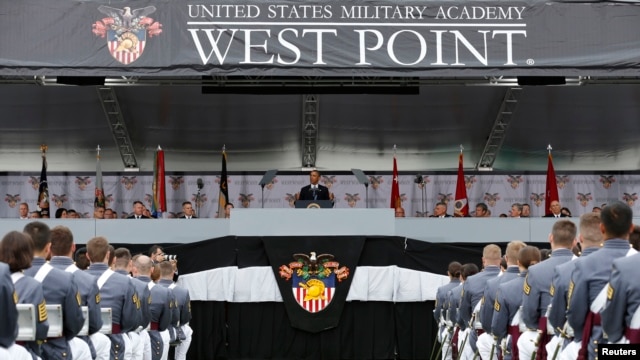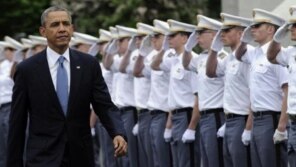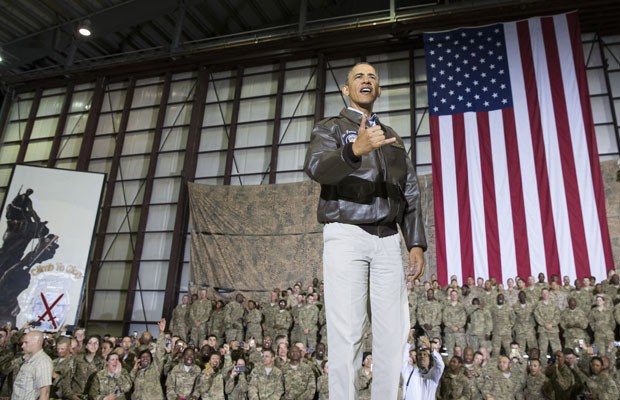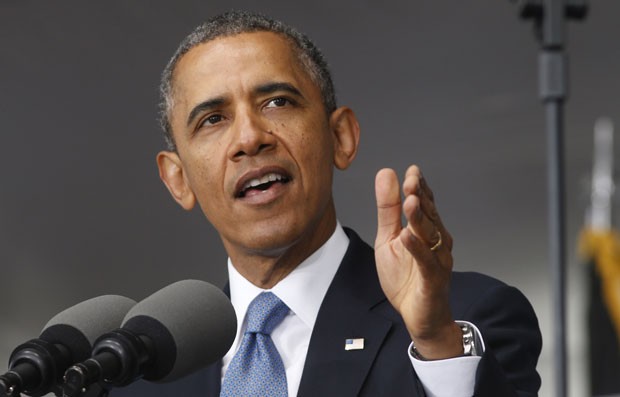
From VOA Learning English, this is In The News.
President Barack Obama this week announced plansfor bringing America’s longest war to what he called aresponsible end. He said that this year the UnitedStates will finish its combat operations in Afghanistan, and give Afghan forces control of the country’ssecurity. Mr. Obama said that after 2014, 9,800 U.S.troops will remain in Afghanistan. But he said they allcould be withdrawn if Afghan leaders do not sign a jointsecurity agreement.
Under the president’s plan, U.S. forces will be out of thecountry by the time he leaves office in 2017. The onlysoldiers left will guard the embassy and diplomats. That would be similar to the situation in Iraq, where Mr.Obama withdrew troops in 2011.
On Wednesday, the president spoke to the men and women finishing studyprograms at the U.S. Military Academy at West Point. He told them that, “youare the first class to graduate since 9/11 who may not be sent into combat inIraq or Afghanistan.”
President Obama used the speech to answer critics of his foreign policy. Hesaid the United States is the most “indispensible” nation in the world. But hewarned against new military interventions.
Critics have called Mr. Obama’s foreign policy unclear and weak. They pointto his decision not to follow up on threats to attack Syria when it usedchemical weapons. They also have criticized his failure to stop Russia frominterfering in Ukraine.
In his speech, Mr. Obama said that, “the most direct threat to America athome and abroad remains terrorism.”
“First, let me repeat a principle I put forward at the outset of my presidency: the United States will use military force, unilaterally if necessary, when ourcore interests demand it.”
Mr. Obama called for a new $5 billion plan to help Yemen, Somalia, Libya andMali fight terrorists. He also said the U.S. would continue drone strikesagainst terrorists and support for Syrian opposition groups.
One of Mr. Obama’s critics is Arizona Senator John McCain. Mr. McCainsays the United States should be arming Syrian rebels. He also is critical ofMr. Obama’s plan for withdrawing troops from Afghanistan. The senatorspoke on Phoenix radio station KFYI, The Barry Young Show.
“We’re now seeing a replay of Iraq in Afghanistan, and one can only questionwhether this whole basis was that he [Obama] would be able to say at the endof his term that the troops are out of both countries….But the first thing theUnited States of America needs to regain is its credibility.”
It is in Congress where Mr. Obama faces much of the criticism over hisforeign policy. Michael O’Hanlon is with the Brookings Institution. He says thepresident’s decision to avoid military action in Syria and Ukraine is probablywhat most Americans wanted. Studies have shown that Americans are tiredof the wars in Iraq and Afghanistan and do not support more militaryadventures.
“…you add up the whole picture, it starts to look a little weak. And then youare open to the charge that foreign leaders have figured out that you do notwant to do much and they’re exploiting the window of opportunity, which is, ofcourse, the charge being made about why (Russian President Vladimir) Putingot so aggressive on the Crimea.”
And that’s In The News, from VOA Learning English. I’m Steve Ember.






